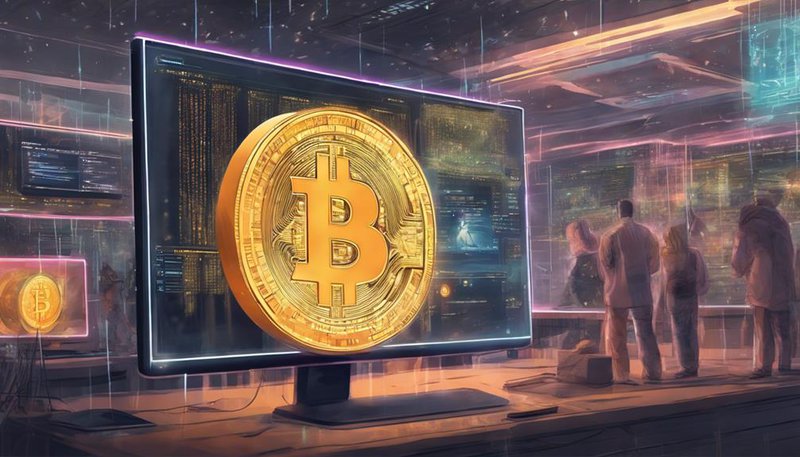What Are NFTs? Understanding Blockchain's Unique Assets

NFTs are unique digital assets on the blockchain that redefine ownership, scarcity, and creator power.
Understanding NFTs involves grasping their value and the technology behind them.
Origins of NFTs
In the early 2010s, the concept of Non-Fungible Tokens (NFTs) began to take shape within the realm of blockchain technology, revolutionizing the way digital assets are authenticated and exchanged. The NFT history and evolution showcase a transformative journey that has significantly impacted the digital landscape. Initially emerging as a novel idea, NFTs have evolved into a powerful tool for creators, collectors, and investors alike.
The cultural impact and significance of NFTs can't be overstated. These unique tokens have bridged the gap between art, technology, and ownership in ways previously unimagined. By providing a secure and transparent platform for buying and selling digital assets, NFTs have democratized access to the world of digital art and collectibles. This newfound accessibility hasn't only revolutionized the art world but has also redefined the concept of ownership in the digital age.
Understanding the origins of NFTs is crucial in appreciating their current relevance and potential future developments. Embracing the evolution of NFTs allows us to grasp their cultural significance and the transformative power they hold within the blockchain ecosystem.
How NFTs Work
With a deep understanding of the origins of NFTs as the foundation, unraveling the mechanics of how these unique tokens operate reveals a fascinating interplay of blockchain technology and digital ownership.
To comprehend how NFTs work, consider the following:
- Decentralized Ownership: NFTs function on blockchain technology, allowing for decentralized ownership. This means that no single entity has complete control over the token, providing security and transparency to the ownership process.
- Digital Scarcity: NFTs derive their value from digital scarcity. Each token is unique and can't be replicated, ensuring that digital assets can be owned, traded, and authenticated securely.
- Smart Contracts: NFTs utilize smart contracts, self-executing contracts with the terms of the agreement directly written into code. Smart contracts enable automatic ownership transfers and provide a secure and efficient way to manage digital assets.
Understanding the intricacies of decentralized ownership, digital scarcity, and smart contracts is crucial in grasping how NFTs operate within the blockchain ecosystem.
Benefits of NFTs

Delve into the realm of Non-Fungible Tokens (NFTs) and uncover the manifold benefits they bring to the digital landscape. NFTs offer a revolutionary solution to provenance and ownership, addressing legal implications by providing a transparent and immutable record of ownership. When it comes to taxation, the unique nature of NFTs allows for clear tracking of transactions, potentially simplifying tax compliance for both creators and buyers.
Moreover, NFTs present an innovative answer to scalability challenges. By their very design, NFTs can represent any unique asset, enabling creators to tokenize a wide array of digital and physical items without the limitations often faced in traditional systems. This scalability opens up new avenues for creators and collectors alike, fostering a more diverse and accessible market.
In terms of environmental impact, NFTs have raised concerns due to the energy-intensive nature of blockchain transactions. As the technology evolves, efforts are being made to address these issues and explore more eco-friendly alternatives, ensuring that the benefits of NFTs can be enjoyed sustainably in the future.
NFT Use Cases
Consider the vast potential of NFTs across varied industries.
Art and collectibles are being revolutionized through unique digital ownership, while gaming and virtual worlds embrace the concept of scarce digital assets.
Furthermore, the music and media sectors are exploring new avenues for distributing and monetizing creative content through non-fungible tokens.
Art and Collectibles
Art and Collectibles serve as prime examples of how Non-Fungible Tokens (NFTs) revolutionize ownership and authenticity in the digital age. When it comes to NFTs in the realm of Art and Collectibles, you delve into a world where traditional values meet cutting-edge technology. Here's how NFTs are transforming this space:
- Art Valuation: NFTs allow for transparent and immutable records of an artwork's provenance and value, enhancing trust and confidence in the art market.
- Ownership Rights: Through NFTs, individuals can securely prove ownership of digital art pieces, providing a new level of control and exclusivity.
- Authenticity Assurance: NFTs enable artists to uniquely tokenize their creations, safeguarding against counterfeits and ensuring the originality of each piece.
Gaming and Virtual Worlds
In the realm of Gaming and Virtual Worlds, NFTs are reshaping the landscape by introducing new dimensions of ownership and value to digital assets. Virtual economies are being revolutionized through the monetization of in-game assets, allowing players to truly own and trade their virtual possessions. This ownership extends beyond the game, empowering players to invest in assets that hold real-world value. NFTs provide a secure and transparent way for players to buy, sell, and collect unique items within the gaming ecosystem. Embracing this technology enhances the gaming experience, fostering a sense of ownership and authenticity for players. The future of gaming and virtual worlds is evolving, offering exciting opportunities for both players and developers alike.
| Benefits of NFTs in Gaming | |
|---|---|
| Ownership | Value |
| Interoperability | Scarcity |
| Provenance |
Music and Media
The utilization of NFTs in the realm of Music and Media brings forth a transformative shift in how digital assets are valued and exchanged. Here are three ways NFTs are revolutionizing the industry:
- Copyright Protection: NFTs offer musicians and creators a secure way to prove ownership and protect their intellectual property rights in the digital space.
- Royalty Distribution: Through smart contracts, NFTs enable automatic royalty distribution to artists, ensuring they receive fair compensation for their work without intermediaries.
- Collectibles and Memorabilia: NFTs allow fans to own unique digital collectibles, such as exclusive music releases or limited edition concert footage, creating new ways for artists to engage with their audience.
Embracing NFTs in Music and Media not only enhances transparency but also empowers creators and fans alike.
Risks of NFTs
Amidst the allure and excitement surrounding NFTs lies a landscape fraught with potential risks and uncertainties. When considering NFTs, it's crucial to address the security concerns that accompany these digital assets.
The decentralized nature of blockchain technology, while offering transparency and immutability, also opens the door to vulnerabilities that malicious actors may exploit. Without proper safeguards in place, there's a risk of unauthorized access, hacking, and theft of NFTs, leading to significant financial losses and reputational damage.
Furthermore, delving into the realm of NFTs brings forth legal implications that demand attention. The complex intersection of intellectual property rights, licensing agreements, and ownership disputes in the digital space poses challenges that require careful navigation. Without a clear understanding of the legal frameworks governing NFTs, individuals may find themselves embroiled in legal disputes that could have far-reaching consequences.
Navigating the risks associated with NFTs requires a diligent approach, grounded in awareness, education, and proactive risk management strategies to safeguard both your investments and interests in this evolving digital landscape.
NFTs Vs. Traditional Assets

Engage in a comparative analysis between NFTs and traditional assets to discern the unique characteristics and advantages each category offers in the realm of digital and physical investments.
- Investment comparison: NFTs, known for their digital exclusivity, provide a new dimension to investing compared to traditional assets like stocks or real estate. While traditional assets have a long-standing history, NFTs offer a fresh and innovative way to diversify your investment portfolio.
- NFT liquidity: Unlike traditional assets that often require time-consuming processes to convert into cash, NFTs can be more liquid due to their digital nature. This liquidity can provide investors with quicker access to their funds when needed, offering flexibility and agility in managing their financial resources.
- Value proposition, Asset diversification: NFTs bring a unique value proposition by offering ownership of digital art, collectibles, or virtual real estate, allowing for a diversified investment approach beyond conventional options. This diversification can help spread risk and potentially enhance overall returns in a well-rounded investment strategy.
Future of NFTs
In navigating the evolving landscape of digital investments, it is crucial to anticipate the unfolding potential and impact of NFTs as they shape the future of asset ownership and value creation. The future of NFTs holds promise and challenges alike. While NFT adoption continues to surge, regulatory challenges loom in the horizon, creating a dynamic environment for investors and creators to navigate.
| Future of NFTs | ||
|---|---|---|
| NFT Adoption | Regulatory Challenges | |
| – Increasing mainstream acceptance | – Unclear legal frameworks | |
| – Integration in gaming and entertainment industries | – Potential for fraud and scams | |
| – Diversification of use cases beyond art | – Tax implications and compliance issues | |
| – Emerging opportunities for digital real estate | – Protection of intellectual property rights | |
| – Potential for fractional ownership models | – Global regulatory variations |
The future of NFTs promises a landscape rich with innovation and potential, yet challenges such as regulatory uncertainties and legal complexities must be addressed to ensure the sustainable growth and security of this burgeoning market.
Investing in NFTs

As you venture into the world of NFT investments, it's crucial to adopt well-thought-out strategies that align with your financial goals. Understanding the risks associated with this evolving market is paramount in making informed decisions.
Stay informed about the latest market trends and engage in thorough analysis to navigate the complexities of the NFT investment landscape.
NFT Investment Strategies
Crafting a successful NFT investment strategy requires a deep understanding of the digital asset market and a keen eye for emerging trends. To navigate this dynamic landscape effectively, consider the following key points:
- Risk Management: Prioritize protecting your investments by setting clear risk tolerance levels and implementing strategies to mitigate potential losses.
- Portfolio Diversification: Spread your investments across a variety of NFTs to reduce risk exposure and increase the potential for long-term growth.
- Stay Informed: Continuously educate yourself on market developments, emerging technologies, and changing consumer preferences to make well-informed investment decisions.
Risks to Consider
Protecting your NFT investments requires a keen awareness of the potential risks inherent in this volatile market. Legal implications can arise due to unclear ownership rights and copyright issues.
Security concerns loom large, as hackers target the digital wallets where NFTs are stored. Regulatory challenges add another layer of complexity, with differing laws worldwide regarding the recognition and taxation of NFTs.
Moreover, the unregulated nature of the market increases the scam potential, making it essential to thoroughly research the authenticity of NFTs and the credibility of sellers. To navigate these risks successfully, stay informed, seek expert advice, and exercise caution in every transaction.
Market Trends and Analysis
Navigating the world of NFT investments requires a keen eye for emerging market trends and a strategic approach to analysis. When delving into this realm, consider the following:
- Market Analysis: Stay informed about the latest market trends and fluctuations to make well-informed investment decisions.
- Growth Projections: Keep an eye on growth projections within the NFT space to identify potential opportunities for maximizing returns.
- Regulatory Implications and Legal Challenges: Understand the legal landscape surrounding NFTs to ensure compliance and mitigate risks associated with regulatory changes.
Frequently Asked Questions
Can NFTs Be Used as Collateral for Loans or Other Financial Transactions?
Utilizing NFTs as collateral can have significant financial implications, offering a new avenue for transactions. The unique nature of blockchain assets brings both opportunities and challenges to this innovative approach, requiring careful consideration.
Are There Any Copyright or Intellectual Property Issues to Consider When Buying or Selling Nfts?
When buying or selling NFTs, copyright implications and ownership rights need careful consideration. Ensure you understand the intellectual property associated with the NFTs to avoid any legal disputes or infringement issues.
How Do NFTs Impact the Environment in Terms of Energy Consumption and Carbon Footprint?
In terms of energy consumption and carbon footprint, NFTs have raised concerns about their environmental impact. Sustainability is crucial in this digital landscape. Understanding and addressing these issues can lead to a more eco-friendly approach to blockchain technology.
Are There Any Regulations or Legal Implications to Consider When Trading or Holding Nfts?
When trading NFTs, you must navigate regulatory challenges and legal implications. Stay informed and seek counsel to ensure compliance. Protect your investments and reputation by understanding the rules governing this innovative but complex market.
Can NFTs Be Hacked or Manipulated in Any Way, and What Measures Are in Place to Protect Them From Security Threats?
To safeguard NFTs against hacking or manipulation, encryption and secure protocols are fundamental. Protecting these digital assets hinges on proactive security measures that shield against vulnerabilities. Stay vigilant and prioritize NFT security for lasting protection.








